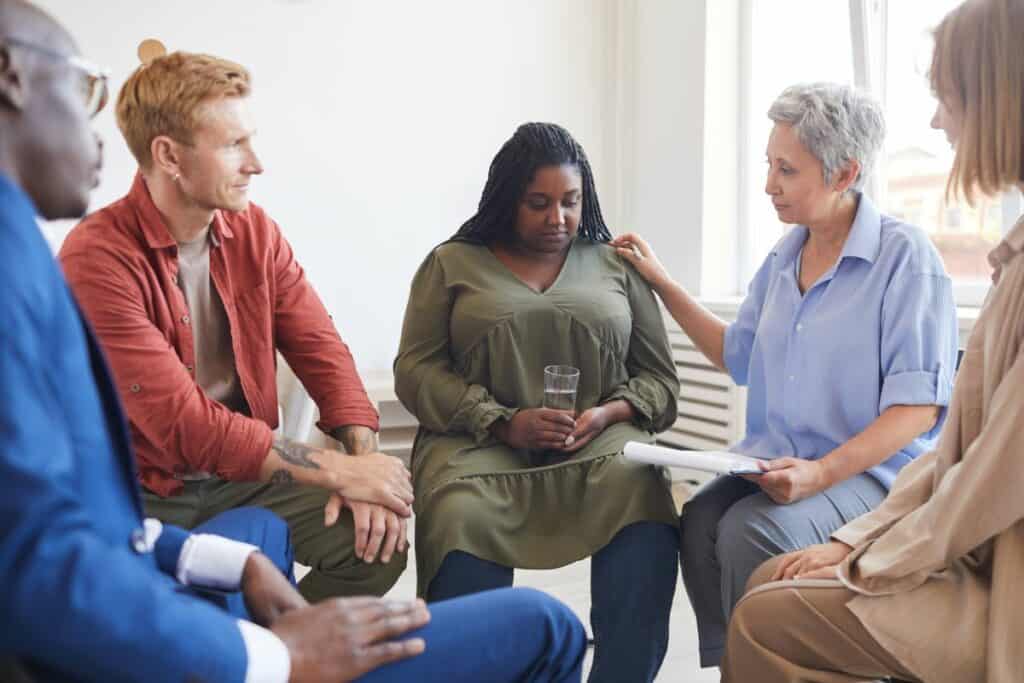Group therapy, a dynamic and highly effective form of psychotherapy, presents a powerful avenue for personal growth, self-discovery, and healing.
It capitalizes on the synergy created when individuals with similar concerns or challenges come together to support and learn from one another.
The techniques and benefits of group therapy are both fascinating and multifaceted, making this therapeutic approach a valuable resource in the field of mental health and personal development.
Group Therapy: An Overview

Group therapy is a well-established and effective form of psychological treatment where a small, carefully selected group of individuals meets regularly under the guidance of a trained therapist.
It has been proven to be equally effective as individual therapy for many different types of mental health issues, such as depression, anxiety, and interpersonal conflicts.
Group therapy offers several unique therapeutic benefits, including providing participants with a safe and supportive environment to explore difficult emotions, gain new perspectives from others facing similar issues, and practice new interpersonal skills.
The group setting also creates a sense of belonging, fostering mutual understanding and reducing feelings of isolation.
Treatment plans in group therapy are typically tailored to meet the unique needs of each member, with therapists often adapting or combining different techniques and approaches to provide the most effective care.
The therapist’s role in the group is crucial, both in terms of facilitating a safe and supportive environment and in guiding the therapeutic process.
Group therapy can be conducted in a variety of settings, such as hospitals, community mental health centers, private practice, or schools.
The duration of a group therapy program may range from a few weeks to ongoing and open-ended sessions, depending on the needs of the participants and the specific issues being addressed.
Types of Group Therapy

This therapeutic approach is often employed in conjunction with individual therapy, providing a balanced and comprehensive treatment plan that addresses the unique emotional and psychological needs of each person.
Psychoeducational Groups
Psychoeducational groups aim to inform and educate individuals about specific issues that may be affecting their mental health.
In these groups, participants acquire information and knowledge about a particular topic, such as anxiety, depression, or substance abuse.
The primary goal is to help individuals understand and cope with their issues by providing information and tools for effective problem-solving.
Psychoeducational groups often include presentations, discussions, and hand-outs facilitating learning and understanding.
Support Groups
Support groups provide participants a safe and nurturing environment to share their experiences and emotions with others facing similar situations.
The primary purpose of support groups is to offer emotional support and encouragement to group members.
In these groups, individuals typically share their personal stories, listen to others, and receive advice from peers who have undergone similar challenges.
Support groups can focus on various topics, such as grief, addiction, or chronic illness.
Skills Development Groups
Skills development groups focus on teaching participants specific skills to improve their interpersonal relationships, communication, or coping strategies.
These groups often use experiential exercises, role-playing, and other practical methods to teach new skills and help group members practice them.
Common goals of skills development groups include enhancing communication, assertiveness, or mindfulness techniques.
Participating in these groups can strengthen their emotional and social competencies in a supportive environment.
Behavioral Intervention Groups

Behavioral intervention groups use evidence-based techniques, such as cognitive-behavioral therapy (CBT), to help participants identify, challenge, and change dysfunctional thoughts and behaviors that contribute to their emotional distress.
In a behavioral intervention group, participants actively work on modifying their thoughts and actions that lead to problematic behaviors and emotions.
These groups often include homework assignments, self-monitoring activities, and other behavioral strategies aimed at fostering personal growth and development.
Self-Help Groups
Self-help groups are organized and led by the participants themselves rather than by professional therapists or counselors.
In these groups, peers who share similar experiences, struggles, or life circumstances come together to provide mutual support, encouragement, and guidance.
Self-help groups often focus on specific challenges, such as addiction recovery or mental health disorders.
By exchanging their experiences, insights, and coping strategies, individuals in self-help groups can gain valuable perspective and support from their peers.
Process of Group Therapy
In group therapy, participants engage with a trained therapist who facilitates discussions, activities, and exercises designed to help members develop coping skills, improve communication, and promote self-awareness.
Open and Closed Groups
In a group therapy setting, there are two main types of groups: open and closed.
Open groups allow new members to join at any time, while closed groups have a fixed number of members with no new additions during the course of the therapy.
Closed groups usually have shorter wait times and can offer a stronger sense of community and group cohesiveness, as members are consistently present throughout the therapy process.
Therapy Sessions

During therapy sessions, various activities and exercises are employed to facilitate discussions, emotional support, and interpersonal learning among the group members.
This can include role-playing, problem-solving, and sharing personal experiences.
The group setting allows members to develop a sense of belonging and benefit from the support and insights of their peers.
Conflict Management
Struggles and conflicts are common in group therapy, as individuals often have differing perspectives, emotions, and needs.
Conflict management is an essential skill in this context, as it helps group members navigate disagreements in a healthy and constructive manner.
Therapists often use techniques such as active listening, empathic responses, and anger management practices to facilitate this process.
Ultimately, the goal is to foster a safe and supportive environment for personal growth.
Confidentiality and Trust
Maintaining confidentiality and trust is crucial for the success of group therapy.
Members must feel safe to share their thoughts, feelings, and experiences without the fear of judgment or information being disclosed outside the group.
Establishing clear boundaries and a mutual understanding of the importance of privacy helps to build a strong therapeutic alliance among group members.
As trust develops, individuals are more likely to be open and honest, contributing to the effectiveness of the therapy experience.
Benefits of Group Therapy

Group Therapy, a dynamic and collaborative approach to mental health and personal development, offers a wealth of benefits that extend beyond the traditional one-on-one therapeutic setting.
It is a space where individuals facing similar challenges come together to share their experiences, support one another, and work towards common goals.
Imparting Information
Group therapy provides an opportunity for participants to share knowledge and experiences.
Through this, individuals can learn from one another, helping them better understand the issues they face or even discover new coping strategies.
This exchange of information not only benefits the individual but fosters a communal sense of support and understanding within the group.
Alleviating Isolation
One of the primary benefits of group therapy is the alleviation of isolation that many participants feel as a result of their struggles.
Participating in a structured group setting makes individuals realize they are not alone.
This universality helps to reduce feelings of loneliness, providing comfort and a sense of belonging in a safe, supportive environment.
Promoting Self-Awareness
Participation in group therapy encourages introspection and self-awareness, helping individuals gain a better understanding of their thoughts, emotions, and behaviors.
Through interaction with others and honest, open feedback, participants can identify patterns that may be problematic or self-defeating.
This increased self-awareness helps to foster growth and empowers individuals to make healthier choices in their lives.
Development of Socialization Techniques
A key element of group therapy is the development of socialization techniques.
Group sessions provide a safe environment for participants to practice expressing themselves, learning how to engage in healthy conversations, and developing conflict resolution skills.
This interpersonal learning directly benefits participants by improving their communication and supporting the formation of stronger relationships outside of the group setting.
Hope and Encouragement

One of the most significant benefits of group therapy is the instillation of hope and encouragement among its participants.
Witnessing the progress and growth of fellow group members serves as a powerful motivator, fostering resilience and optimism.
Through shared experiences, successes, and challenges, individuals can find inspiration to overcome their own difficulties and continue on their journey toward healing and self-improvement.
Issues Addressed in Group Therapy
Group therapy provides an environment for individuals to work through various issues collectively with the support of a therapist and fellow group members.
Some common concerns addressed in group therapy sessions include anxiety and depression, substance use disorders, and family and relationship issues.
Anxiety and Depression
Group therapy can be particularly beneficial for individuals dealing with anxiety and depression.
Through group sessions, participants can share their experiences, learn from others, and develop coping strategies to manage their symptoms.
In a group therapy setting, therapists may utilize various techniques to address anxiety and depression, such as cognitive-behavioral therapy, mindfulness practices, and exposure therapy.
By discussing shared experiences and supporting one another, group members can foster a sense of belonging, enhance their understanding of their mental health issues, and improve their overall well-being.
Substance Use Disorders
Group therapy is also an effective treatment option for individuals struggling with substance use disorders, such as addiction to drugs or alcohol.
In these group sessions, participants can explore and address the underlying issues driving their substance use, learn effective coping skills, and develop healthier habits.
This type of therapy might include cognitive-behavioral interventions, motivational enhancement, and educational components.
Participating in group therapy for substance use disorders helps individuals build a support system and increases their accountability for their recovery, leading to improved outcomes in the long run.
Family and Relationship Issues

Group therapy can also cover various family and relationship issues, such as divorce, domestic violence, and parenting challenges.
Through guided discussions and sharing of personal experiences, participants can learn to navigate complex emotions, communicate effectively, and build lasting connections.
By working together in a supportive and non-judgmental environment, group members can develop empathy, enhance problem-solving skills, and explore individual roles in interpersonal dynamics.
Addressing family and relationship issues in this setting allows participants to gain new perspectives, leading to more satisfying connections and healthier interaction patterns.
Online Group Therapy
Online group therapy has gained popularity in recent years as more people seek mental health support in a digital environment.
This form of therapy allows individuals to engage in therapeutic conversations and exercises with other group members and a therapist, all from the comfort of their own homes.
These online sessions are typically conducted via video conferencing platforms such as Circles or Monument, ensuring effective communication and fostering a sense of connection among participants.
Accessibility
One of the key advantages of online group therapy is its accessibility. Individuals residing in remote locations or those unable to travel to in-person sessions can now readily access therapeutic support.
This can be particularly beneficial for those dealing with transportation barriers, physical disabilities, or social anxiety.
The convenience of attending sessions from home also encourages adherence to therapy, which can ultimately improve treatment outcomes.
Availability
Another notable aspect of online group therapy is the availability of specialized groups catering to specific concerns or populations.
For example, support groups focused on depression, anxiety, addiction, or trauma can provide participants with a safe space to relate to others with similar experiences.
This sense of shared understanding can foster empathy, reduce feelings of isolation, and promote the development of healthy coping strategies.
Privacy and Confidentiality

Privacy and confidentiality are essential components of online therapy.
To protect participant information, reputable therapy providers employ secure encryption and adhere to strict guidelines outlined by professional associations and governing bodies.
This commitment to privacy ensures the participants can openly discuss their experiences and emotions in a secure environment without fear of their information being compromised.
Frequently Asked Questions
What are common techniques used in group therapy?
Group therapy utilizes a variety of techniques to help individuals gain insight, develop coping skills, and foster a sense of belonging.
Some common techniques include psychodynamic group psychotherapy, where members explore unconscious motives and conflicts; cognitive-behavioral therapy (CBT), which focuses on changing thought patterns and behaviors; and support groups, where members share their experiences and offer emotional support.
How does group therapy help individuals with depression?
Group therapy helps individuals with depression by providing a supportive environment to discuss their emotions, challenges, and experiences.
Through group interactions, members can gain new perspectives, learn coping strategies, and receive validation for their feelings.
Additionally, participating in group therapy can alleviate feelings of isolation and loneliness by fostering connections with others facing similar struggles.
What is the main objective of group therapy?
The main objective of group therapy is to promote individual growth and healing through interpersonal interactions within a group setting.
Group therapy aims to help individuals develop self-awareness, improve communication and social skills, increase emotional expression, and learn effective coping strategies.
Through the shared experiences and insights of group members, individuals are able to gain a broader perspective and recognition of their own issues and progress.
Can you provide some examples of group therapy activities?
Group therapy activities are designed to help promote communication, trust, and emotional expression among group members.
Some examples of group therapy activities include:
- Icebreakers: These help group members build rapport and establish a sense of safety and trust in the group setting.
- Role-playing: Encourages members to practice new behaviors, develop empathy, and gain insights into their own or others’ feelings.
- Experiential exercises: Art therapy, music therapy, or movement therapy can be used to engage group members and explore emotions creatively.
- Problem-solving: Helps group members develop effective coping strategies and deal with challenges faced in their daily lives.





